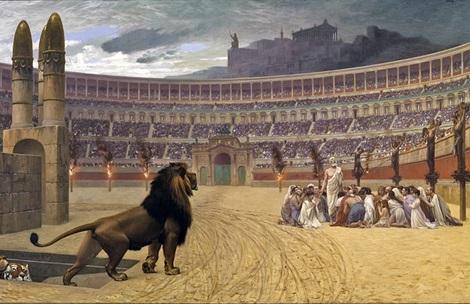The Reason
The Reason

The death of the Roman Emperor Claudius in the year 54 A.D. passed the throne to his elder son Lucius. Only 16 at the time, Lucius thought of political power as his destiny. Because of his age, Lucius initially ruled under the advice of his tutor, Seneca, and of his mother, Agrippina, but quickly gained confidence and soon began to consolidate his power. When, in the following year, Lucius' younger brother Britannicus appeared to be garnering favor among the Roman Senate, Lucius arranged for his murder. A few years later, suspecting disloyalty, he had his own mother killed. Lucius' insecurity knew no bounds; the 14 years of his reign were marked by violent efforts to forestall suspected opposition and to cast blame on anyone but himself. Lucius is better known today by the name he gave himself, Nero Claudius Caesar, or simply Nero.
When Nero took power, Christians were already in disfavor in the Empire. While the Jewish religion honored a God unknown to the Romans, the Jews generally kept their faith to themselves, and their leaders were loyal to Rome – who could forget their shouts of “We have no king but Caesar!” (John 19:15)? Christians, on the other hand, not only proclaimed their faith far and wide, but were actively spreading that faith to others, and living by it. To most Romans, the Christians' refusal to compromise their faith seemed to risk inciting the wrath of some or all of Rome's pagan gods; in later years the historian Tertullian would describe the mood:
The Christians are to blame for every public disaster and every misfortune that befalls the people. If the Tiber rises to the walls, if the Nile fails to rise and flood the fields, if the sky withholds its rain, if there is earthquake or famine or plague, straightway the cry arises: The Christians to the lions!
Many individual Christians suffered at the hands of their neighbors because of this attitude, and Christianity itself was quickly perceived as a threat to official Rome. Emperor worship was obviously at odds with the faith of the Christians, but the way Christians openly professed allegiance to a power higher than the Emperor was especially troubling to those who thought themselves destined to be the world's political masters. The clash between Christianity and the murderously insecure Nero was as inevitable as it was terrible. Finding Christians to be an easy target, with so many non-Christians already hostile to them, Nero launched a campaign of persecution unmatched in history. Not content with the tortures of the past (c.f. Hebrews 11:36-37), Nero invented new atrocities with which to inflict his targets – and by which any negative attention could be drawn from himself. To profess Christianity during Nero's reign was to place oneself among the ranks of the most hated class in the Empire.
It was at this time, to these people, and in the midst of acknowledging the terrible persecution afoot in the land, that Peter addressed the words “always be ready to give a defense to everyone who asks you a reason for the hope that is in you” (1 Peter 3:15). His exhortation here is not that Christians should have hope, or even that they ought to express it; the assumption of the text is that, despite the persecution they suffered, despite the very real danger they faced, the faith of those to whom these words were directed would be so evident that others were bound not only to notice it but to demand an explanation, a reason, for that hope.
Each generation faces its own trials; each person must deal with his or her own limits. While many Christians in the world today face persecution every bit as savage as that which Nero imposed on Christianity in his time, few in North America have been threatened with imminent physical danger in defense of our faith. To be sure, the subtler persecutions of our time, such as employment opportunities from which Christians must exclude themselves, are no less serious tests of our faith man the prospect effacing literal lions, but what of our response? When the world sees us acting according to our faith, does it see exuberant trust, or just mute, or perhaps even grudging, resignation? Do those around us see a believer standing before a loving Father, or just another zealot following religious rules? Do they see our sure hope? Do they ask the reason?
Now hope does not disappoint, because the love of God has been poured out in our hearts by the Holy Spirit who was given to us.Romans 5:5

Add new comment